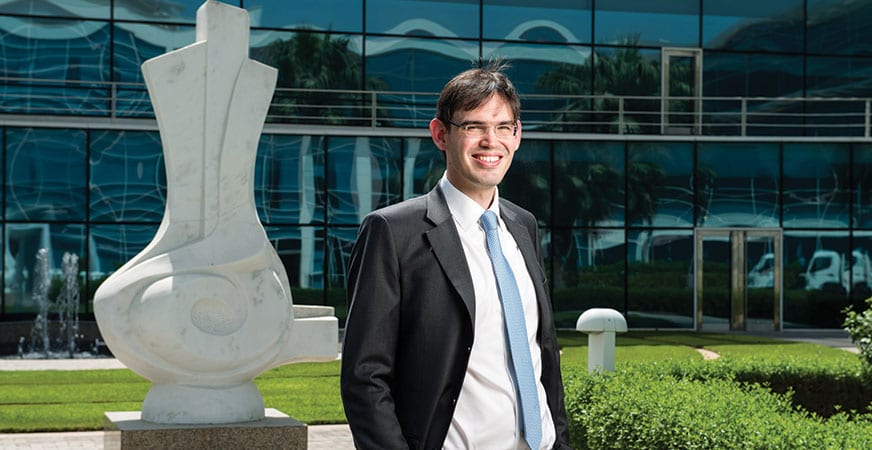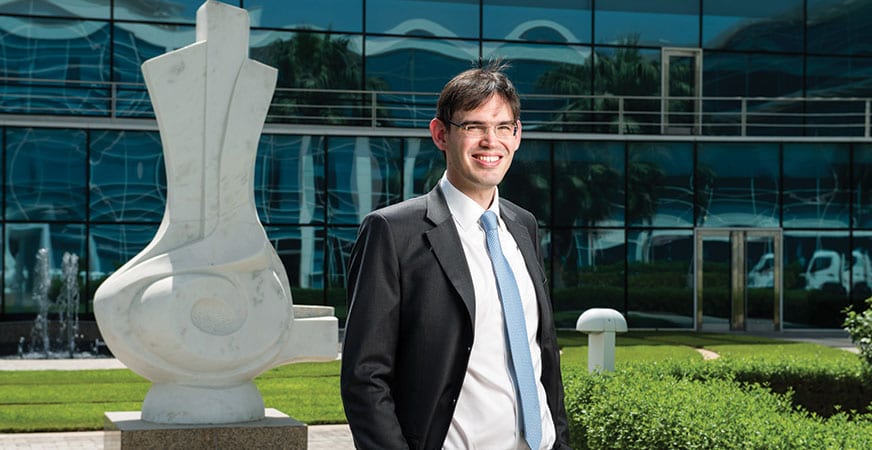
- James Adams
- Group Treasurer, Chalhoub Group
My Life in Treasury
James Adams FCT, Group Treasurer, Chalhoub Group
We welcomed James Adams to TMI most recently in editions 244 and 245 having participated in the very well-received roundtable discussions in Dubai that TMI conducted in association with D+H. In this edition, James, who is a very active member of the Association of Corporate Treasurers (ACT) including the Middle East Committee, describes some of his experiences in treasury so far, and offers advice to finance professionals who are new to the profession.
How did you come into treasury and what attracted you to the profession?
I started my career in the UK as part of the finance graduate scheme at Tesco plc, during which time I completed the CIMA (Chartered Institute of Management Accountants) qualification. While completing this, I became aware of treasury and was attracted to the variety and depth of activities in which treasurers are engaged. As a CIMA-qualified professional, I was able to fast-track to the AMCT (ACT associate membership qualification) by completing just the specialist treasury papers, and I decided to take advantage of this opportunity. During this time, a role opened up in treasury at Tesco and I never looked back.
How did your career progress through to the role that you hold today?
I spent nine years at Tesco in several different finance and treasury roles, culminating in a treasury management system project and overseas secondment to the Korean business. I then had the opportunity to move to Deloitte to join the treasury advisory group. Although I had developed significant depth of experience at Tesco, the advisory role enabled me to expand my breadth of experience, and I worked with a wide variety of different organisations with diverse strategic and operational challenges. While at Deloitte, I worked on a project in the Middle East to set up a new treasury function, which then needed someone to head it up, which is how I came to join Chalhoub Group. It’s very rare to be able to get to know a business before joining, so I came in with my eyes open and a great deal of background knowledge. I have now been at Chalhoub for three years, during which time I’ve settled in Dubai, completed the MCT (ACT member qualification) and received the FCT designation (ACT Fellowship).
How have demands and needs in terms of treasury changed over the course of your career, and what particular skills does it now require?
Treasury has undoubtedly come under the spotlight in recent years, not only during the global financial crisis, but also the extended period of volatility and uncertainty that we are experiencing now. This places greater demands on treasury skills in areas such as funding, strategic cash management and risk management. While the core treasury skills themselves have not changed, the demand is greater, and there is more scrutiny from senior management and shareholders, so treasurers have had to develop their communication skills, and become more strategic in their approach. For example, at Chalhoub, our treasury team is able to contribute to, and influence business decisions in a way that would not have been possible in the past.
The culture and organisational structure of a company will also affect the role of treasury and therefore the skills required. Like other corporations headquartered in the Middle East, for example, certain aspects of Chalhoub are quite decentralised, so some cash and treasury management activities are conducted by local finance and accounting teams. Therefore, group treasury needs to spend more time on education and setting up work teams to ensure consistent policies and controls than in a more centralised business.
[[[PAGE]]]
What qualities do you look for when you are recruiting for your department?
We look for potential as much as past experience. Treasury professionals need to invest in self-development and be able to work proactively and independently, particularly in a smaller department where there is more diversity in the range of activities in which people are likely to engage.
How important do you think a formal treasury education is, as opposed to (or as well as) more general finance or accountancy qualifications?
From my experience of completing both types of qualification, I think a formal treasury education bridges the gap between accountancy and finance, and plays an essential role in building transferable skills and knowledge. Prior to studying MCT, I already had several years of treasury experience. However, MCT took this to a strategic level and has been invaluable in my current role. As a result of my experiences with ACT, I joined the ACT committee promoting education and membership amongst the treasury community in the Middle East. Treasury is at an earlier stage of evolution in this region than in countries such as the UK, but treasury skills and expertise are becoming increasingly important in light of geopolitical and economic developments over the past decade.
Based on your career so far, what would your advice be to finance professionals who are perhaps in their first treasury role?
It’s important to be open-minded about new experiences, and volunteer for new challenges and projects that arise. There is a great deal of variety in treasury, so if you are proactive, there is a wide range of activities to become involved with, and multiple ways in which decisions taken in treasury can impact on shareholder value.
What book have you read recently that you would recommend, and why?
My wife is from South Korea, so we have travelled extensively in the country. One book that I have recently read and found particularly enlightening is Korea: The Impossible Country by Daniel Tudor, which explores how South Korea has developed from being described as one of the poorest countries in the world to one of the most developed over the past fifty years. Not only is it a fascinating story, but it potentially has lessons for other regions such as the Middle East.










